The Psychology of Health and Illness: A Personal Obesity Case
VerifiedAdded on 2023/05/30
|5
|891
|497
Essay
AI Summary
This essay provides a personal reflection on obesity, examining the various social, environmental, and physical factors that contributed to the author's condition. It highlights the role of financial stress, posttraumatic stress, sleep deprivation, lack of physical activity, genetics, and poor eating habits in the development of obesity. The essay draws upon empirical studies to support the claims, emphasizing the complex interplay of psychological and biological factors in health and illness. The conclusion underscores the importance of managing these factors to control obesity. The document also includes questions for classmates to encourage discussion on the prevalence and management of obesity.
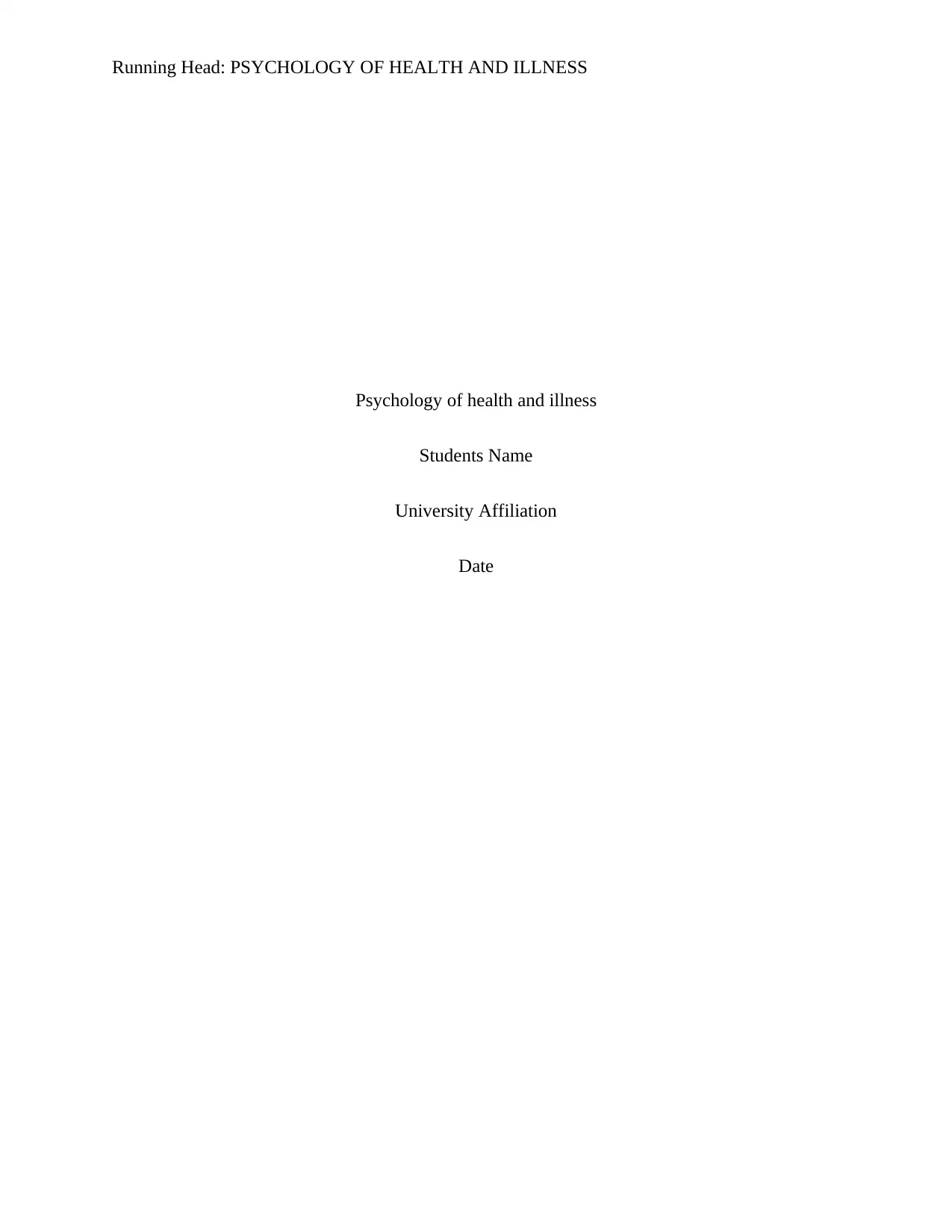
Running Head: PSYCHOLOGY OF HEALTH AND ILLNESS
Psychology of health and illness
Students Name
University Affiliation
Date
Psychology of health and illness
Students Name
University Affiliation
Date
Paraphrase This Document
Need a fresh take? Get an instant paraphrase of this document with our AI Paraphraser
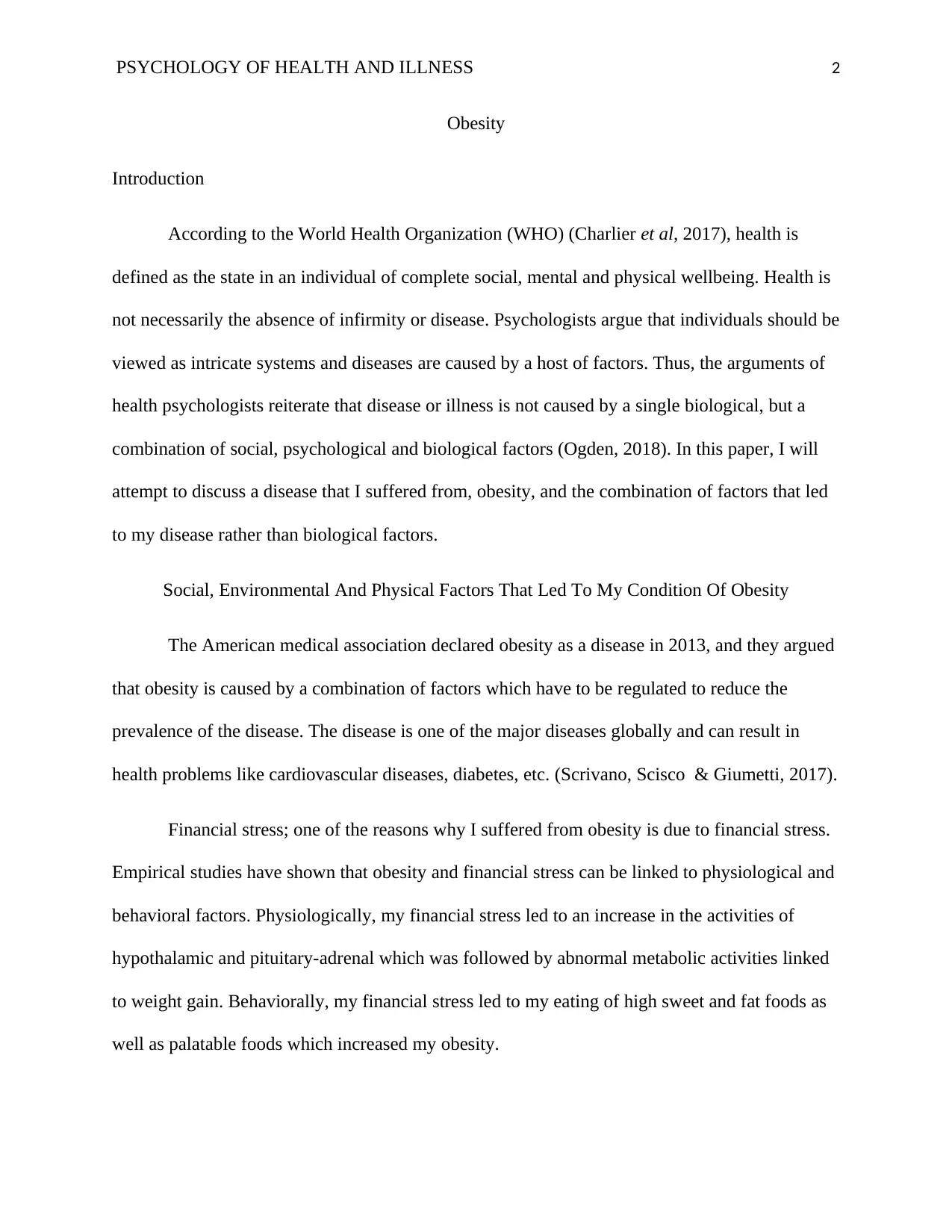
PSYCHOLOGY OF HEALTH AND ILLNESS 2
Obesity
Introduction
According to the World Health Organization (WHO) (Charlier et al, 2017), health is
defined as the state in an individual of complete social, mental and physical wellbeing. Health is
not necessarily the absence of infirmity or disease. Psychologists argue that individuals should be
viewed as intricate systems and diseases are caused by a host of factors. Thus, the arguments of
health psychologists reiterate that disease or illness is not caused by a single biological, but a
combination of social, psychological and biological factors (Ogden, 2018). In this paper, I will
attempt to discuss a disease that I suffered from, obesity, and the combination of factors that led
to my disease rather than biological factors.
Social, Environmental And Physical Factors That Led To My Condition Of Obesity
The American medical association declared obesity as a disease in 2013, and they argued
that obesity is caused by a combination of factors which have to be regulated to reduce the
prevalence of the disease. The disease is one of the major diseases globally and can result in
health problems like cardiovascular diseases, diabetes, etc. (Scrivano, Scisco & Giumetti, 2017).
Financial stress; one of the reasons why I suffered from obesity is due to financial stress.
Empirical studies have shown that obesity and financial stress can be linked to physiological and
behavioral factors. Physiologically, my financial stress led to an increase in the activities of
hypothalamic and pituitary-adrenal which was followed by abnormal metabolic activities linked
to weight gain. Behaviorally, my financial stress led to my eating of high sweet and fat foods as
well as palatable foods which increased my obesity.
Obesity
Introduction
According to the World Health Organization (WHO) (Charlier et al, 2017), health is
defined as the state in an individual of complete social, mental and physical wellbeing. Health is
not necessarily the absence of infirmity or disease. Psychologists argue that individuals should be
viewed as intricate systems and diseases are caused by a host of factors. Thus, the arguments of
health psychologists reiterate that disease or illness is not caused by a single biological, but a
combination of social, psychological and biological factors (Ogden, 2018). In this paper, I will
attempt to discuss a disease that I suffered from, obesity, and the combination of factors that led
to my disease rather than biological factors.
Social, Environmental And Physical Factors That Led To My Condition Of Obesity
The American medical association declared obesity as a disease in 2013, and they argued
that obesity is caused by a combination of factors which have to be regulated to reduce the
prevalence of the disease. The disease is one of the major diseases globally and can result in
health problems like cardiovascular diseases, diabetes, etc. (Scrivano, Scisco & Giumetti, 2017).
Financial stress; one of the reasons why I suffered from obesity is due to financial stress.
Empirical studies have shown that obesity and financial stress can be linked to physiological and
behavioral factors. Physiologically, my financial stress led to an increase in the activities of
hypothalamic and pituitary-adrenal which was followed by abnormal metabolic activities linked
to weight gain. Behaviorally, my financial stress led to my eating of high sweet and fat foods as
well as palatable foods which increased my obesity.
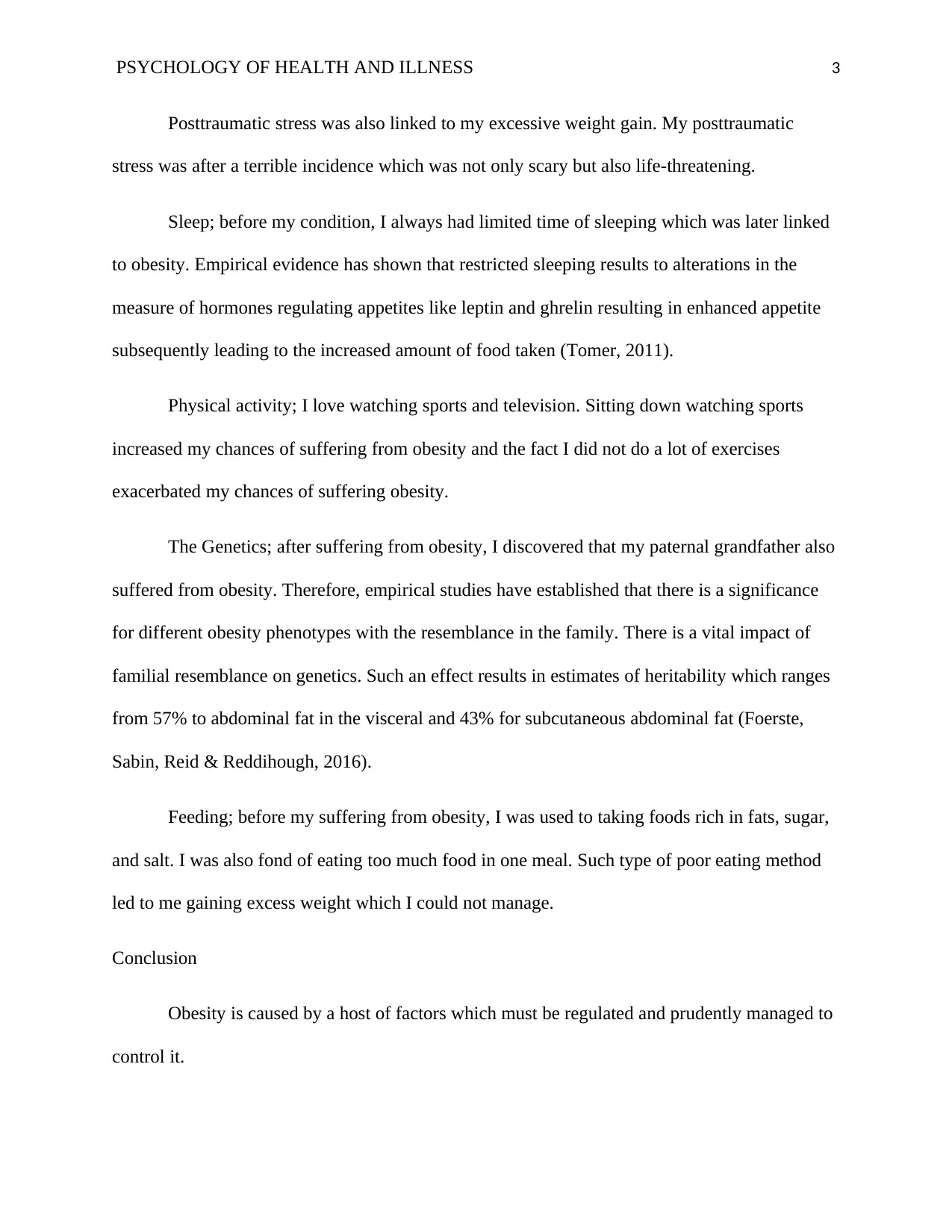
PSYCHOLOGY OF HEALTH AND ILLNESS 3
Posttraumatic stress was also linked to my excessive weight gain. My posttraumatic
stress was after a terrible incidence which was not only scary but also life-threatening.
Sleep; before my condition, I always had limited time of sleeping which was later linked
to obesity. Empirical evidence has shown that restricted sleeping results to alterations in the
measure of hormones regulating appetites like leptin and ghrelin resulting in enhanced appetite
subsequently leading to the increased amount of food taken (Tomer, 2011).
Physical activity; I love watching sports and television. Sitting down watching sports
increased my chances of suffering from obesity and the fact I did not do a lot of exercises
exacerbated my chances of suffering obesity.
The Genetics; after suffering from obesity, I discovered that my paternal grandfather also
suffered from obesity. Therefore, empirical studies have established that there is a significance
for different obesity phenotypes with the resemblance in the family. There is a vital impact of
familial resemblance on genetics. Such an effect results in estimates of heritability which ranges
from 57% to abdominal fat in the visceral and 43% for subcutaneous abdominal fat (Foerste,
Sabin, Reid & Reddihough, 2016).
Feeding; before my suffering from obesity, I was used to taking foods rich in fats, sugar,
and salt. I was also fond of eating too much food in one meal. Such type of poor eating method
led to me gaining excess weight which I could not manage.
Conclusion
Obesity is caused by a host of factors which must be regulated and prudently managed to
control it.
Posttraumatic stress was also linked to my excessive weight gain. My posttraumatic
stress was after a terrible incidence which was not only scary but also life-threatening.
Sleep; before my condition, I always had limited time of sleeping which was later linked
to obesity. Empirical evidence has shown that restricted sleeping results to alterations in the
measure of hormones regulating appetites like leptin and ghrelin resulting in enhanced appetite
subsequently leading to the increased amount of food taken (Tomer, 2011).
Physical activity; I love watching sports and television. Sitting down watching sports
increased my chances of suffering from obesity and the fact I did not do a lot of exercises
exacerbated my chances of suffering obesity.
The Genetics; after suffering from obesity, I discovered that my paternal grandfather also
suffered from obesity. Therefore, empirical studies have established that there is a significance
for different obesity phenotypes with the resemblance in the family. There is a vital impact of
familial resemblance on genetics. Such an effect results in estimates of heritability which ranges
from 57% to abdominal fat in the visceral and 43% for subcutaneous abdominal fat (Foerste,
Sabin, Reid & Reddihough, 2016).
Feeding; before my suffering from obesity, I was used to taking foods rich in fats, sugar,
and salt. I was also fond of eating too much food in one meal. Such type of poor eating method
led to me gaining excess weight which I could not manage.
Conclusion
Obesity is caused by a host of factors which must be regulated and prudently managed to
control it.
⊘ This is a preview!⊘
Do you want full access?
Subscribe today to unlock all pages.

Trusted by 1+ million students worldwide
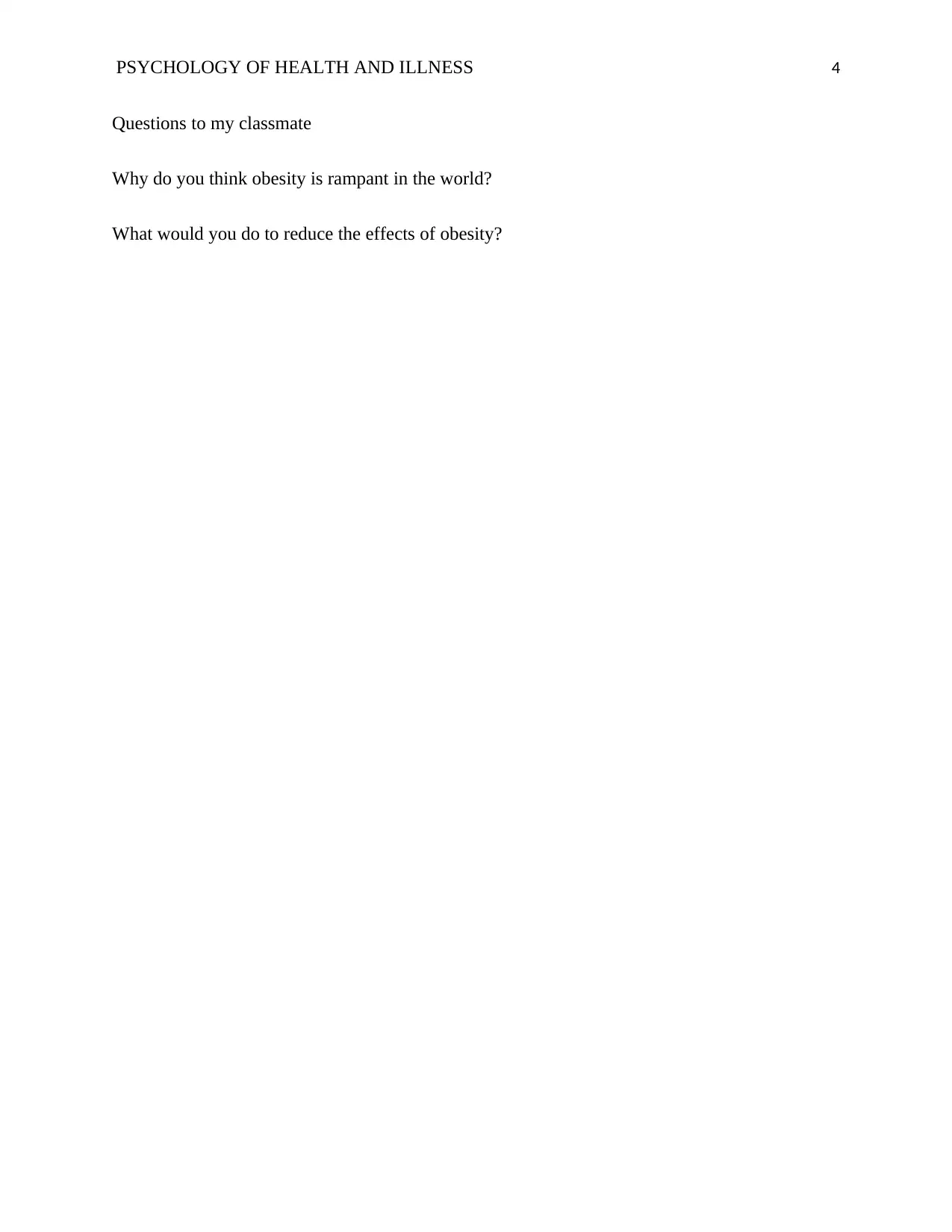
PSYCHOLOGY OF HEALTH AND ILLNESS 4
Questions to my classmate
Why do you think obesity is rampant in the world?
What would you do to reduce the effects of obesity?
Questions to my classmate
Why do you think obesity is rampant in the world?
What would you do to reduce the effects of obesity?
Paraphrase This Document
Need a fresh take? Get an instant paraphrase of this document with our AI Paraphraser
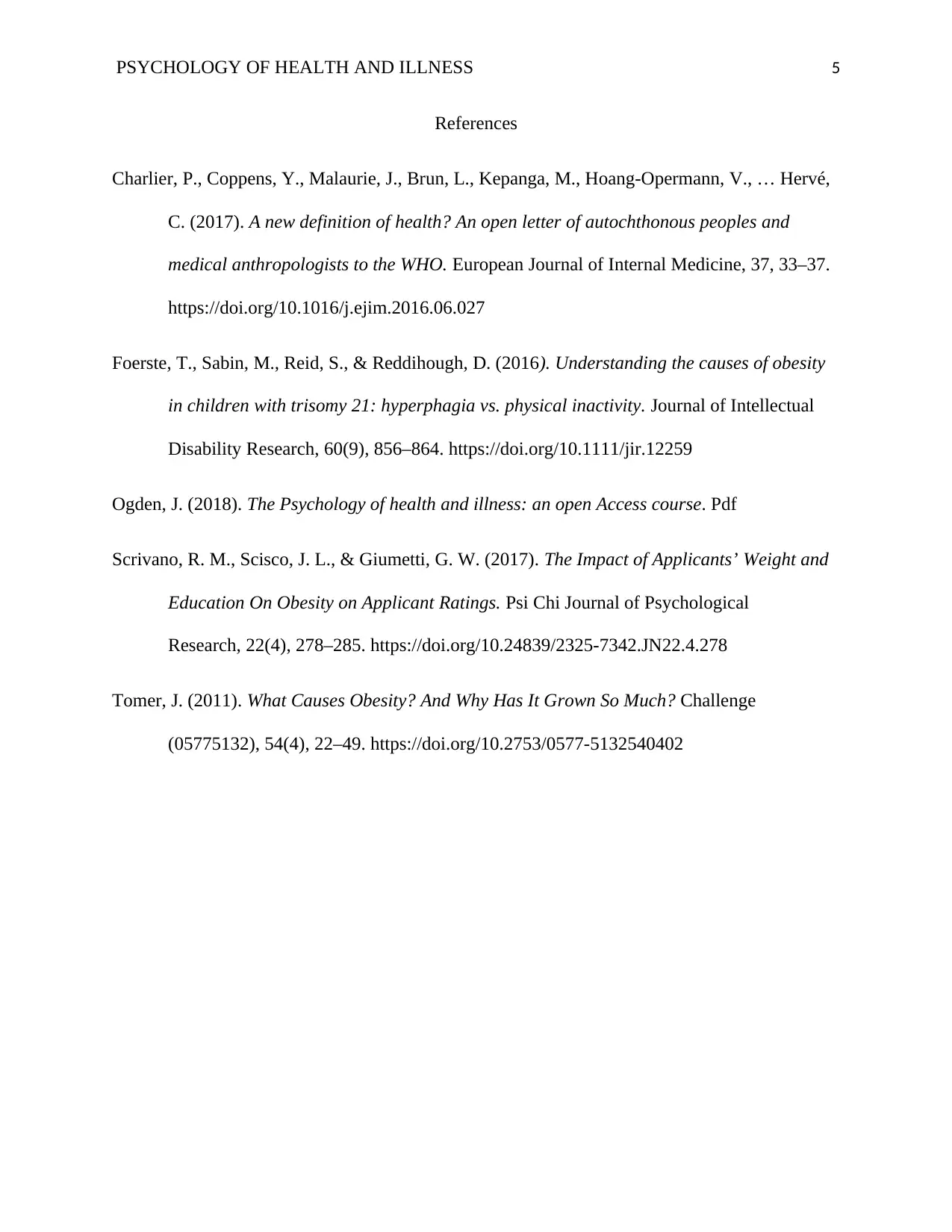
PSYCHOLOGY OF HEALTH AND ILLNESS 5
References
Charlier, P., Coppens, Y., Malaurie, J., Brun, L., Kepanga, M., Hoang-Opermann, V., … Hervé,
C. (2017). A new definition of health? An open letter of autochthonous peoples and
medical anthropologists to the WHO. European Journal of Internal Medicine, 37, 33–37.
https://doi.org/10.1016/j.ejim.2016.06.027
Foerste, T., Sabin, M., Reid, S., & Reddihough, D. (2016). Understanding the causes of obesity
in children with trisomy 21: hyperphagia vs. physical inactivity. Journal of Intellectual
Disability Research, 60(9), 856–864. https://doi.org/10.1111/jir.12259
Ogden, J. (2018). The Psychology of health and illness: an open Access course. Pdf
Scrivano, R. M., Scisco, J. L., & Giumetti, G. W. (2017). The Impact of Applicants’ Weight and
Education On Obesity on Applicant Ratings. Psi Chi Journal of Psychological
Research, 22(4), 278–285. https://doi.org/10.24839/2325-7342.JN22.4.278
Tomer, J. (2011). What Causes Obesity? And Why Has It Grown So Much? Challenge
(05775132), 54(4), 22–49. https://doi.org/10.2753/0577-5132540402
References
Charlier, P., Coppens, Y., Malaurie, J., Brun, L., Kepanga, M., Hoang-Opermann, V., … Hervé,
C. (2017). A new definition of health? An open letter of autochthonous peoples and
medical anthropologists to the WHO. European Journal of Internal Medicine, 37, 33–37.
https://doi.org/10.1016/j.ejim.2016.06.027
Foerste, T., Sabin, M., Reid, S., & Reddihough, D. (2016). Understanding the causes of obesity
in children with trisomy 21: hyperphagia vs. physical inactivity. Journal of Intellectual
Disability Research, 60(9), 856–864. https://doi.org/10.1111/jir.12259
Ogden, J. (2018). The Psychology of health and illness: an open Access course. Pdf
Scrivano, R. M., Scisco, J. L., & Giumetti, G. W. (2017). The Impact of Applicants’ Weight and
Education On Obesity on Applicant Ratings. Psi Chi Journal of Psychological
Research, 22(4), 278–285. https://doi.org/10.24839/2325-7342.JN22.4.278
Tomer, J. (2011). What Causes Obesity? And Why Has It Grown So Much? Challenge
(05775132), 54(4), 22–49. https://doi.org/10.2753/0577-5132540402
1 out of 5
Related Documents
Your All-in-One AI-Powered Toolkit for Academic Success.
+13062052269
info@desklib.com
Available 24*7 on WhatsApp / Email
![[object Object]](/_next/static/media/star-bottom.7253800d.svg)
Unlock your academic potential
Copyright © 2020–2026 A2Z Services. All Rights Reserved. Developed and managed by ZUCOL.



